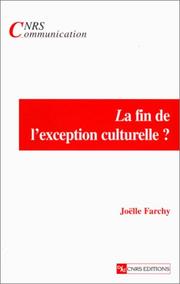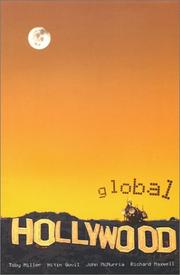| Listing 1 - 10 of 360 | << page >> |
Sort by
|
Book
ISBN: 9780198787792 9780199603510 9780191750052 0199603510 0198787790 Year: 2015 Publisher: Oxford: Oxford university press,
Abstract | Keywords | Export | Availability | Bookmark
 Loading...
Loading...Choose an application
- Reference Manager
- EndNote
- RefWorks (Direct export to RefWorks)
The Oxford Handbook of Creative Industries is a reference text that brings together many of the world's leading scholars in the application of creativity in economics, business and management, law, policy studies, organization studies and psychology. While creative industries research has become a regular theme across these subjects, this volume collects this knowledge in a single authoritative source. The Handbook is organized into five Parts: Following the editors' introduction, Part I on Creativity includes individual creativity, and how this scales up to teams, social networks, and cities. Part II addresses Valuing Creativity and Creating Value, including markets for symbolic goods, art auctions, labor markets, then value-creating agents and considers how performance is measured in the creative industries. Part III covers the dynamics of Organizing Creative Industries, with chapters on project ecologies, the management of project-based organizations in creative industries, organizing events in creative fields, user innovation, and niches, genres and classification. Part IV, Industrial Organization and Creative Economy, explains sunk costs and dynamics of creative industries, economic spillovers, the role of brokerage and mediation in creative industry networks, and disintermediation and glocalisation due to digital technology. Part V covers Policy and Development, offering chapters on copyright, government policy and how creative industries extend into Global Production Networks, affecting development. Covering emerging economies and new technologies, the Handbook will be of interest to scholars and students of the arts, business, innovation, and government. -- from back cover.
Multi
ISBN: 9783839413746 3839413745 Year: 2010 Publisher: Bielefeld, Germany transcript Verlag
Abstract | Keywords | Export | Availability | Bookmark
 Loading...
Loading...Choose an application
- Reference Manager
- EndNote
- RefWorks (Direct export to RefWorks)
This book offers a fundamental contribution to the literature on the creative industries and the knowledge-based economy by focusing on three aspects: urban spaces as key sites of capitalist restructuring, creative industries' policies as state technologies aimed at economic exploitation, and the role of networks of aesthetic production in inflecting these tendencies. It simultaneously goes beyond these debates by integrating a concern with the cultural and aesthetic dimensions of the creative industries. As such, the book is relevant to researchers interested in the transdisciplinary project of a cultural political economy of creativity and urban change.
Book
ISBN: 9782807610057 2807610056 2807610056 Year: 2018 Publisher: Bruxelles, Belgium: P.I.E. Peter Lang,
Abstract | Keywords | Export | Availability | Bookmark
 Loading...
Loading...Choose an application
- Reference Manager
- EndNote
- RefWorks (Direct export to RefWorks)
Book
ISBN: 9782807609198 2807609198 280760921X 2807609201 2807609228 Year: 2018 Volume: 6 Publisher: Bruxelles: Peter Lang,
Abstract | Keywords | Export | Availability | Bookmark
 Loading...
Loading...Choose an application
- Reference Manager
- EndNote
- RefWorks (Direct export to RefWorks)
"The assessment of the challenges of digital platforms for cultural industries raises many different issues. How platforms choices in content pricing affect the overall value of cultural markets, especially in the case where content just aim at favoring devices' sales? How are revenues shared between platforms and content right holders? Do creators and artists all benefit from the growth of digital platforms? How usual business models of cultural industries have to adapt to the digital paradigm? Should we observe rather a reinforcement of the star system or the emergence of a long tail? What is the impact on market concentration? Could we expect an increase or a decrease in cultural diversity? What is the role played by recommender systems, playlists and algorithms in influencing consumers' choices? How to implement efficient public policies given the transnational dimension of digital platforms? The various papers gathered in this book contribute further to these different topics with a focus on empirical issues. The first part gathers the contributions dealing with the analysis of the impact that digital platforms have on the incumbent or legacy players of the original value chain of content industries: content providers, live entertainment producers, consumers, etc. The second part opens the black box of the ecosystem of digital platforms by studying competition among them and among the business models they adopt, as well as the conditions for the emergence of new players." --

ISBN: 2271056330 9782271056337 Year: 2002 Volume: *2 Publisher: Paris: CNRS,
Abstract | Keywords | Export | Availability | Bookmark
 Loading...
Loading...Choose an application
- Reference Manager
- EndNote
- RefWorks (Direct export to RefWorks)
Art and state --- Arts --- Cultural industries --- Economic aspects --- Mass communications --- Economics --- France --- Cultural policy --- Arts - Economic aspects - France --- Cultural industries - France --- Art and state - France --- France - Cultural policy
Book
ISBN: 287854322X 9782878543223 Year: 2005 Publisher: Paris: Presses de la Sorbonne Nouvelle,
Abstract | Keywords | Export | Availability | Bookmark
 Loading...
Loading...Choose an application
- Reference Manager
- EndNote
- RefWorks (Direct export to RefWorks)
Les arts du spectacle recouvrent aussi bien la création, la représentation, la médiation, l'interprétation que la réception. Les industries culturelles sont devenues à la fois une appellation polysémique et un vocable qui suggère une grille d'analyse à dominante économique et culturelle. Les métiers seraient ce référent à un savoir-faire professionnel, aux pratiques et aux connaissances qui ne sont plus limités à quelques auteurs, mais concerneraient l'ensemble des acteurs d'un projet collectif. La visée de cet ouvrage est de revisiter ces trois pôles, de montrer comment leurs articulations ont, au fil de l'histoire, sous-tendu la manière d'appréhender les interactions entre œuvre, production et public. Il s'agit au fond de saisir les traits d'une généalogie : initiatives des acteurs, trajectoires, confluences, cheminements diversifiés, influence des groupes de pression, transformation des systèmes, émergence de conventions, constructions réglementaires ou élaborations institutionnelles.
Performing arts --- Cultural industry --- Arts du spectacle --- Industrie culturelle --- Congresses --- Congrès --- Cultural industries --- Congrès --- Performing arts - Congresses --- Cultural industries - Congresses
Book
ISBN: 9782844854360 2844854362 Year: 2012 Publisher: Paris Editions Allia
Abstract | Keywords | Export | Availability | Bookmark
 Loading...
Loading...Choose an application
- Reference Manager
- EndNote
- RefWorks (Direct export to RefWorks)
Philosophy, German --- Popular culture. --- Cultural industries --- Culture --- Philosophie allemande --- Culture populaire --- Industries culturelles --- Philosophy --- Philosophie

ISBN: 0851708455 Year: 2001 Publisher: London British Film Institute
Abstract | Keywords | Export | Availability | Bookmark
 Loading...
Loading...Choose an application
- Reference Manager
- EndNote
- RefWorks (Direct export to RefWorks)
Motion picture industry --- -Motion picture industry --- -Film industry (Motion pictures) --- Moving-picture industry --- Cultural industries --- Economic aspects --- -Los Angeles --- -Economic aspects --- -Cultural industries --- Film industry (Motion pictures) --- Hollywood (Los Angeles, Calif.) --- United States --- California --- Los Angeles (Calif.)
Book
ISBN: 9780691162829 0691162824 0691185433 0691208646 Year: 2018 Publisher: Princeton : Princeton University Press,
Abstract | Keywords | Export | Availability | Bookmark
 Loading...
Loading...Choose an application
- Reference Manager
- EndNote
- RefWorks (Direct export to RefWorks)
The digital revolution poses a mortal threat to the major creative industries--music, publishing, television, and the movies. The ease with which digital files can be copied and distributed has unleashed a wave of piracy with disastrous effects on revenue. Cheap, easy self-publishing is eroding the position of these gatekeepers and guardians of culture. Does this revolution herald the collapse of culture, as some commentators claim? Far from it. In Digital Renaissance, Joel Waldfogel argues that digital technology is enabling a new golden age of popular culture, a veritable digital renaissance. By reducing the costs of production, distribution, and promotion, digital technology is democratizing access to the cultural marketplace. More books, songs, television shows, and movies are being produced than ever before. Nor does this mean a tidal wave of derivative, poorly produced kitsch; analyzing decades of production and sales data, as well as bestseller and best-of lists, Waldfogel finds that the new digital model is just as successful at producing high-quality, successful work as the old industry model, and in many cases more so. The vaunted gatekeeper role of the creative industries proves to have been largely mythical. The high costs of production have stifled creativity in industries that require ever-bigger blockbusters to cover the losses on ever-more-expensive failures. Are we drowning in a tide of cultural silt, or living in a golden age for culture? The answers in Digital Renaissance may surprise you.
Popular culture --- Cultural property --- Cultural industries --- Culture populaire. --- Patrimoine culturel --- Industries culturelles --- Protection --- Technological innovations --- Protection. --- Innovations technologiques. --- Popular culture. --- Technological innovations. --- Cultural property - Protection. --- Cultural industries - Technological innovations.
Book
ISBN: 9781625341723 9781613763711 1613763719 1625341725 9781625341716 1625341717 Year: 2016 Publisher: Amherst
Abstract | Keywords | Export | Availability | Bookmark
 Loading...
Loading...Choose an application
- Reference Manager
- EndNote
- RefWorks (Direct export to RefWorks)
Country music --- History and criticism --- Music trade --- Tennessee (Etat) --- Nashville (Tenn.) --- Music business --- Music industry --- Cultural industries --- History and criticism.
| Listing 1 - 10 of 360 | << page >> |
Sort by
|

 Search
Search Feedback
Feedback About UniCat
About UniCat  Help
Help News
News